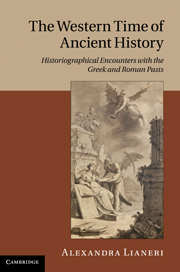Book contents
- Frontmatter
- Contents
- Acknowledgements
- Notes on contributors
- INTRODUCTION
- THEORISING WESTERN TIME: CONCEPTS AND MODELS
- ANCIENT HISTORY AND MODERN TEMPORALITIES
- UNFOUNDING TIME IN AND THROUGH ANCIENT HISTORICAL THOUGHT
- AFTERWORD
- 14 Ancient history in the eighteenth century
- 15 Seeing in and through time
- Bibliography
- Index
14 - Ancient history in the eighteenth century
from AFTERWORD
Published online by Cambridge University Press: 03 May 2011
- Frontmatter
- Contents
- Acknowledgements
- Notes on contributors
- INTRODUCTION
- THEORISING WESTERN TIME: CONCEPTS AND MODELS
- ANCIENT HISTORY AND MODERN TEMPORALITIES
- UNFOUNDING TIME IN AND THROUGH ANCIENT HISTORICAL THOUGHT
- AFTERWORD
- 14 Ancient history in the eighteenth century
- 15 Seeing in and through time
- Bibliography
- Index
Summary
As imperceptibly one approaches ripe old age, time becomes an ever more problematic concept. One's relationship to events changes, for they lie in the past rather than the future: so time past overtakes time future, as one becomes truly an ancient historian. As a result I begin to feel more at home in the twentieth century, which is supposed to have passed away, than in either antiquity or the present. Does this mean that I can stand outside the relationship between these two polarities that we are considering? Certainly new ideas seem more and more to reflect old ones – and I mean reflect rather than repeat; for it is no criticism to see the renewal of past ideas in a modern guise.
My situation is of course the inverse of the theory proposed by François Hartog. For him the regimes of historicity move from the dominance of the past until the nineteenth century to the dominance of the future in the post-Darwinian age, and now to a form of presentism that, since the collapse of Marxism, sees all history as meaningless except in relation to the present, and therefore as relative to our current issues in a post-modern sense. This movement is the opposite of natural human experience, which progresses from a situation where the future is all that holds meaning, to a form of activity that embraces presentism in adult life, and finally to Shakespeare's sixth age of ‘the lean and slipper'd pantaloon’, where meaning is created by memories of the past, and where old friends, old books and old wine are better than new.
- Type
- Chapter
- Information
- The Western Time of Ancient HistoryHistoriographical Encounters with the Greek and Roman Pasts, pp. 301 - 306Publisher: Cambridge University PressPrint publication year: 2011
- 1
- Cited by

